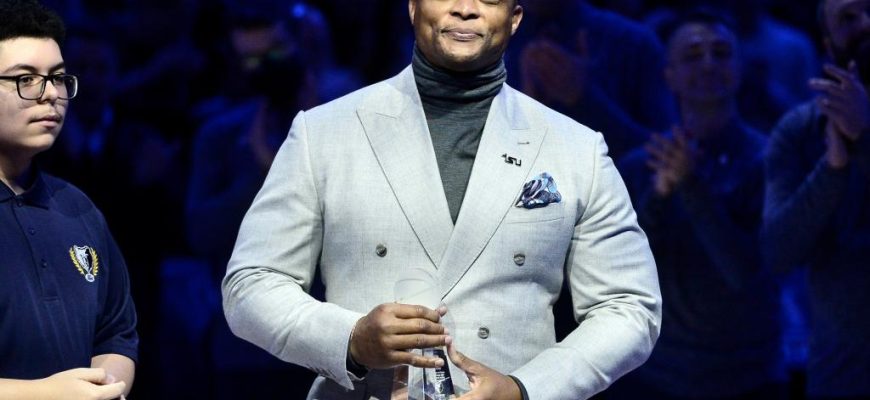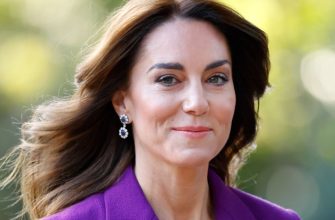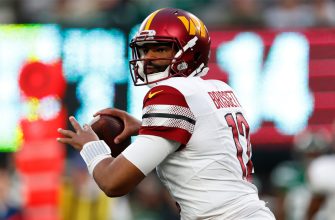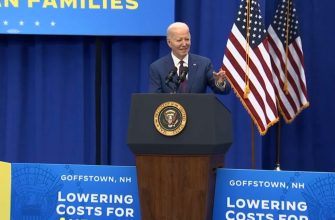Eddie George had no plans to coach football.
The long hours turned off the former Tennessee Titans All-Pro running back. He loved having time to invest in his golf game. He was building his wealth management business and acting in movies, TV and plays, including starring on Broadway as Billy Flynn in “Chicago.”
“Trying to win a HEGOT,” George said. “That’s Emmy, Grammy, Oscar, Tony, but Heisman’s on the front of it.”
The 1995 Heisman Trophy winner at Ohio State laughed after he delivered the line like a pro from his seat in a Halas Hall conference room.
George was taking a quick breather during a hectic three-week stretch with the Chicago Bears in the Bill Walsh diversity coaching fellowship, a program designed to give minority coaches experience at the NFL level. Florida State co-defensive coordinator and linebackers coach Randy Shannon, the former head coach at Miami, is also on hand at Bears organized team activities.
Nine days into his stint, George had been all over the Bears facility, not just participating in football meetings and practices but consulting with support staff and even picking the brain of Bears President and CEO Kevin Warren. George’s goal is to gather strategies from throughout the organization to bring back to Tennessee State, where he enters his third year as head coach.
“Every day, I try to find one thing, just one thing that I can take home with me, because it’s a lot,” George told the Tribune. “Three weeks is not enough time to really take it all in, so I try to give myself the grace to say, ‘OK, go with the experience and just seek to learn something new every day, and also be a resource for the young men that are here that have questions.’”
When Bears running backs coach David Walker reached out to ask George to apply, noting the Bears specifically were looking to do something for head coaches, George didn’t want to pass up the learning opportunity.
A little more than two years ago, Tennessee State offered George the chance to become its head coach. In the NFL, George rushed for 10,441 yards over nine seasons, started 130 straight games and made four Pro Bowls. But he had no coaching experience.
Being the CEO of a football program intrigued George, and he asked himself if he would regret turning down Tennessee State’s offer. He knew he would. And he believed in the experiences that led him to that point. He knew football from his playing career, leadership from fathering two sons, how to listen from being an actor and how to plan from his business ventures.
“So all of it has prepared me for this moment,” he said.
George’s Tennessee State teams have gone 9-13 over his first two seasons. His third season will begin with a trip to Notre Dame, the first time the Irish will face an HBCU team and a game that reportedly comes with a $1 million payday for Tennessee State.
As George prepares for his third year, OTAs presented a good time to join the Bears. Tennessee State players are away from the facility until summer school and conditioning start at the beginning of June. He still holds staff meetings every day at 1:30 p.m. between Bears practices and meetings.
George said he starts his day at 5:30 a.m. with a workout before connecting with different people in Halas Hall. He sits in on the special teams meetings because he believes in great special teams play.
Naturally, he is drawn to the offensive meetings about the Bears running game, which he duly noted put up a franchise-record 3,014 rushing yards in 2022 under new offensive coordinator Luke Getsy. George takes note of what they teach, emphasize and call.
As George made the transition from actor and businessman to coach, his biggest learning curve was managing people — understanding who he does and doesn’t want in his program, trying to get them to buy in and properly articulating his vision to inspire them.
The fellowship with the Bears gives him a chance to examine different leaders, including coach Matt Eberflus.
“Very cool and calm,” George said of Eberflus. “I love his approach. I love how he’s a no-nonsense guy. He knows what he wants. I have not heard him dog-cuss anybody. He talks to you like a man. And his staff has been great too.”
Eberflus said George is consulting with staffers in charge of nutrition, strength and conditioning, and game management, among other things.
And George is meeting with Warren, studying how he plans to build an organization that can sustain a championship culture long term. George is fascinated with how to get things right across a program.
“How you pay attention to detail because the players can sense it and feel it,” George said. “If you cut corners in any aspect in this building, they will see that and they’re going to cut corners. So I’m looking at it all and I want to know it all, down to how they fold the towels and get your laundry back to you in a timely fashion.
“All of the things that you don’t necessarily think matter, they really matter. Everybody watches. And how do you hold people accountable to that?”
The fellowship is named after former San Francisco 49ers coach Bill Walsh, who started an internship program for minority coaches at his training camp in 1987. The league eventually adopted the fellowship for all teams. Mike Tomlin, Lovie Smith and Marvin Lewis are among the coaches who came through it.
The Bears have had several former players, including Nathan Vasher, Roosevelt Williams and Henry Burris, participate in the program. They will add more coaches through the program for training camp.
George and Shannon are particularly high-profile additions this year for OTAs, and their presence benefits the Bears too.
“We’re certainly leaning on those guys for that information that they have,” Eberflus said. “Really our guys gleaned a lot of information from (George) and constantly are asking him questions. So that has been pretty cool to have him around.”
Eberflus had George address the players.
George spoke about the rare opportunity they have in the NFL and the things they can do to make it last, including not getting too comfortable. He talked about his four pillars: physical, spiritual, mental and social well-being. And he advised them to prepare for what comes after football, starting with how they carry themselves as players.
He started to understand the last point during his final years playing, when he started a landscape architecture business before getting his MBA at Northwestern.
“Football is not the end-all, be-all. It is a pathway to your purpose,” George said. “You’re only here for a certain period of time. It ends. You have more life behind you than you have in your football life.
“But the years you have as a football player, especially at an organization like this one, if you do well here — not just on the football field but in terms of character, integrity, who you are — it can last you a lifetime.”
()









